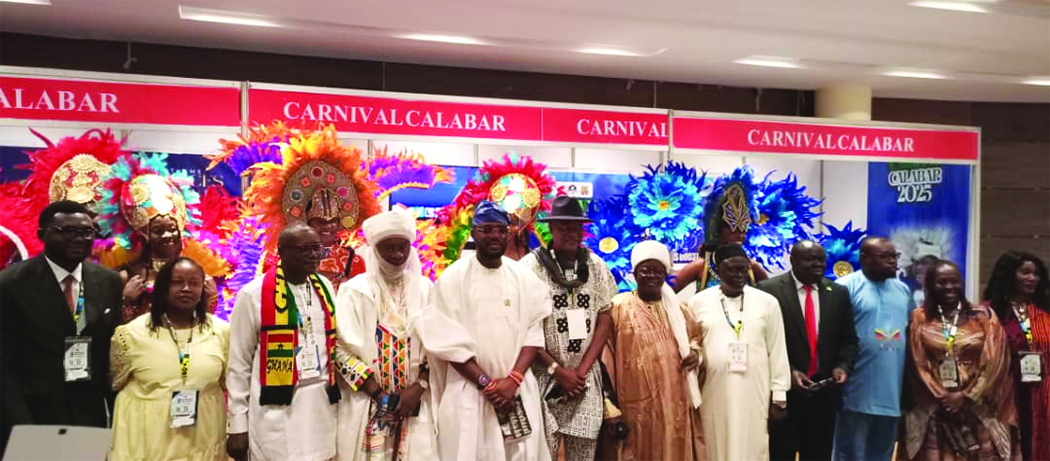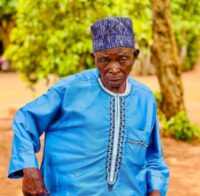Africa’s rich cultural and tourism potential were showcased at the 21st Akwaaba African Travel Market exhibition, writes Charles Ajunwa
Tourists from different parts of the globe gathered under one roof at the 21st Akwaaba African Travel Market exhibition held recently in Lagos.
Outside the venue of the exhibition, tourists, tour operators, journalists, and different stakeholders gathered at the registration desk to pick up their tags in order to have access into the hall. Those registered onsite also got their tags.
Inside the hall, tour operator companies, hotels, travel agencies, airlines, and tourism boards from different countries had their stands where they showcased tourism products. The popular Calabar Carnival girls who were dressed in colourful and elegant attires displayed different dance steps to the admiration of guests. It was three days of thoughtful leadership and engagement, high-level networking, knowledge sharing, celebration of excellence and connections.
The master of the ceremony, Ebele Enemchukwu, who looked splendid in her attire made of fabrics sourced locally, said, “If you have been coming to Akwaaba you may have missed your way trying to get into the hall today. That speaks of 21, and it comes with a different level of maturity.
“For over two decades, this gathering has not just been about exhibitions; it has been about bridges, creating connections and connecting people, countries, businesses, opportunities, and even dreams. Akwaaba has become what many would refer to as the heartbeat that beats even louder. Akwaaba hosts not one, not two, but seven great events under one roof and across three unforgettable days.
“We are honoured to have in our midst the finest leaders and visionaries, tourism champions of our time. We’re glad that you are here and your presence only affirms the fact that this gathering is not just significant but continues to say that the future of African tourism is brighter.
“But you see all of this would not have been possible without the vision and relentless commitment and dedication of one man who every year across his many platforms provides avenues for these conversations where we discuss and tackle the many critical issues facing travel and tourism in not just Nigeria but Africa.”
The Convener and Founder of Akwaaba African Travel Market, Ikechi Uko, who dressed in colourful African fabrics, revealed what inspired him to begin the travel expo 21 years ago.
“I was attending World Travel Markets (WTM) in London, and I found out that all of us have to come to London to sell Africa. And I said to myself, why can’t you get Africans to sell Africa in Africa? And when I pursued that vision, everybody said it was impossible.
“I got insulted. I got chased out of all the travel stands at ITB, at WTM, everywhere. And nobody believed Africans could travel within Africa. So when we started this vision in 2003, 2004, it was an impossible dream. Africans never travelled within Africa. It took like five years before Kenya, Zimbabwe got the vision. And they called me and said, okay, this thing you’re talking about, is it possible that we push it further? So the first countries that actually got involved were Kenya and Zimbabwe to try to sell Africa to Africans.
“Today, if you take Rwanda, Kenya, Ghana, South Africa, their biggest tourists come from Africa. But 15 years ago, nobody believed Africans could go to Africa. The future is very bright, we’re 1.5 to 1.7 billion people and we still get 70 million people a year. Imagine if only 10 per cent of Africans travelled within Africa. No African airline would lack passengers. No African destination would suffer and travel advisories would disappear. I had that vision in 2002, 2003. Today is a reality.
“I want everybody here to also have the vision that we will get 500 million Africans to travel within Africa. It is possible. There is a little map of America that I shared a few days ago. It said, Europeans say, we spend our holiday in America and see the Americans that all Europeans go to. There are only three states. Florida, New York, California, and a little bit in Vegas. That’s all America and Europe want. But where do the Americans go to? Americans are the engine room of American tourism. That is why their President will say, “go to hell”. Why? There is enough domestic tourism to drive that economy. “
He added, “So in Africa, we have enough people with the resources. We have everything we need to be able to create the tourism that we need. That is what gave birth to Akwaaba. Today, we are 21 years. We didn’t disappear. And we are happy that that vision worked. Africans are the biggest travelers in Africa today. So we expect more.
“I expect that out of the 200 million Nigerians, more Nigerians will travel domestically, which is happening now. Because if you check, the bus companies are all bigger and richer than any airline in Nigeria. And this starts with huge capital, which means domestic tourism is thriving. If you check, with our less than one million foreign tourists, our hotels are declaring billions. Where does that money come from? From within. And every Nigerian billionaire became a billionaire in dollars without having foreign money coming to his pocket. All the money was made here. Imagine if we replicate this in 54 African nations. Africa will be great. Africa will be big, and Africa can achieve that through travel and tourism.”
Director General of the National Institute of Hospitality and Tourism (NIHOTOUR), Dr. Abisoye Fagade, in his remarks, described the Akwaaba African Travel Market as a platform that has grown to become Africa’s premier marketplace for ideas, partnership, and innovation in travel and tourism.
According to him, “The gathering comes at a defining moment under the Renewed Hope Agenda of President Bola Tinubu. Tourism and creative economy have been identified as critical pillars for Nigeria’s economy’s diversification and sustainable growth.
“For us, the challenge and opportunity ahead is clear: Standardisation and preservation of the industry. From hotels to restaurants, from tours to operators to event managers, we must operate with globally recognised standards that inspire confidence, attract investment, and guarantee quality. This is why NIHOTOUR is driving the effort of ensuring registration, certification, and compliance across the value chain. Where every practitioner is properly recognised, regulated, we build trust with international visitors. Most importantly, create a tourism ecosystem that is credible, competitive, and future-ready.
“Akwaaba African Travel Market is more than an exhibition. This is a call to action. If he had not taken this action 21 years ago, I’m not sure we’d be here today. Once again, you can imagine having a son or a daughter 21 years ago. Thank you for taking that initiative 21 years and Nigeria owes you. It’s a call to action. A reminder that African tourism renaissance depends on how we all organise ourselves, regulate ourselves, and present ourselves to the world. It’s obvious that we need a common voice.”
Fagade, who dressed in a white Agbada, blue cap and beads on two hands, said Akwaaba was a vision of one man as he called on African to come together in order to replicate similar feat.
“It took them 21 years ago to organise this. One man’s idea, and all of us are coming together. If we refuse to organise ourselves, we might not be able to present ourselves to the world properly. We might be doing well individually, but with us together, we can only be stronger. And with this kind of ideas, we need many more. We have 12 months a year. We can be having tourism events every year, different locations, different times in Nigeria.
“Let us therefore leave this forum with one shared resolve. To make African tourism not only vibrant and diverse, but also standardised, professional, and trusted worldwide. As I often say, if oil built yesterday’s Nigeria. Let tourism and hospitality also try to build Africa’s tomorrow,” Fagade said.
The NIHOTOUR boss, after cutting the tape to declare open the Akwaaba Travel Expo, visiting stands and watching the Calabar Carnival girls with other dignitaries, visited the Jollof Rice stand where 10 chefs from different hotels presented two flavours of Jollof rice. Journalists and foreign delegates sampled the Jollof rice and scored each chef.
Fagade, who tasted all the 20 flavours of Jollof rice, said “I have good news for you guys. I used Andrews Liver salt quite a bit. I can afford to sample all of them. But that being said, I like the fact that the conversation is always around the Jollof rice. And it’s the most talked about component in Africa. There’s nothing bad in the Jollof rice coming from Nigeria. It’s a gift of Nigeria to the world. Let me also use this moment to congratulate Hilda Barci for showing the world how to cook Jollof rice. But on the 6th of December this year, we’ll be doing something great for Nigeria too. The longest dining table.”
He announced a cash prize of N250,000, N150,000 and N100,000 to the first, second and third winners of the Jollof rice competition, including free registration at NIHOTOUR.
Those who attended the opening ceremony included Ciroma of Ilorin Emirate, Abubakar Bature Sulu-Gambari, SAN, the Chairman of Ilorin Emirates Dubar Committee, and Danmasani of Ilorin, Engr. Suleiman Yahaya Alapansanpa, High Commissioner of Rwanda to Nigeria, Ambassador Christophe Bazivamo, President of the Tour Operators Union of Ghana, TOUGHA Yvonne Donkor, and Deputy Chief Executive Officer of the Ghana Tourism Authority (GTA), Ekow Sampson.
Others were President Federation of Tourism Associations of Nigeria (FTAN), Alhaji Aliyu Madaki, Head of School at the Institute of Travel and Tourism of The Gambia, Sheik Ahmed Tejan Iyang, Director General and CEO of Cross River State Tourism Bureau, Mr. Ojoi Ekpenyong, Expert in hospitality business, Mr. Olufemi Adefope, Managing Director of Business Travel Management (BTM) Ltd. and the Vice Chair for Nigeria on the Pan African Tourism Board, Ms Lola Adefope, Hadiza Garbati, CEO of TheXperts, Fifi Josephine Rurangwa, Group General Manager, Continental Hotels Nigeria, Karl Hala, wife of Akwaaba Founder, Mrs. Rita Ikechi Uko and many others.


















Leave a comment